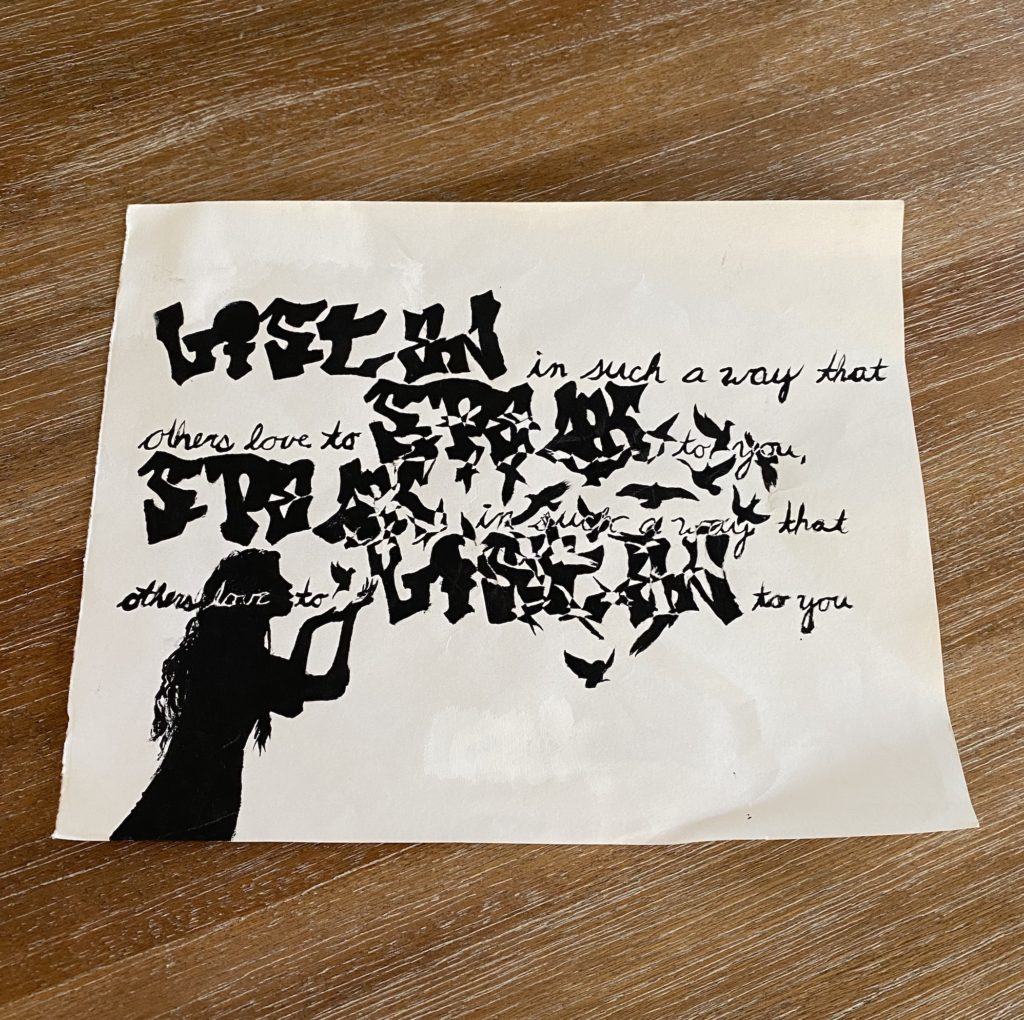In preparing for my last post, when I enjoyed a fresh view of my favorite sentimental things, a piece of paper poked out of the pile in the sink.

Listen in such a way that others love to speak to you. Speak in such a way that others love to listen to you.
In 2017, following another freaky health challenge (tore both ACL’s and one MCL while gently skiing on an innocent cat track), I learned a few things about the concept of listening. I gathered those thoughts, hobbled up on the Capital Church stage, and shared them in a message titled “Don’t Talk with your Mouth Full.” The next week a teenage girl approached me and presented this piece of paper, a gift she had drawn out some of the words I had spoken. As I read them again last week, I was reminded how easy they are to forget. Observing the rising tide and temperature of conversations coming into this week, they seemed worth revisiting. Following is an excerpt of that original message.
Originally delivered on February 18/19, 2017
The ‘-ing’s’ of my life have changed in the past two weeks. I’m not driving, exercising, cleaning, laundering, cooking (not my specialty but I at least used to put the waffle in the toaster), volunteering, errand-running, picking up the same things the same people leave out all day, or grocery shopping. I’ve just got one “ing”: receiving. And it’s humbling. When you can’t do any giving. The only th-ing I do have to give is a little space left on my couch for sitting. Often, the person who pops in to check in or say hello plops down and we have a conversation. Normally, when my knees were capable of holding me in an upright position and a conversation begins in my house, I subconsciously 1) decide it’s the perfect time to clean my counter or sort through the mail or vacuum and/or, 2) steer the discussion toward maximum efficiency.
But over these two weeks, I haven’t made a single chat speedy or been whipped up in my regular frenzy, because there wasn’t any place I’ve had to be. The gift I had to give in return was listening to people talk to me.
One of the first scriptures I ever read when I decided to slowly entertain the idea that there was something intriguing about the strange, intimidating beast of a book called the Bible, was “My dear brothers and sisters, take note of this: Everyone should be quick to listen, slow to speak and slow to become angry.“ (James 1:19)
I reckoned that this James person likely lived in some hippie happy commune where everybody sang kum-bay-a over shared potatoes. He could not have understood today’s world, where one must have to yell, jump up and down and constantly interrupt to get a sliver of someone’s constantly divided attention and where most folks are just a single click away from being entirely entitled or extremely offended. I was wrong.
James understood being human. And he was teaching a basic truth about how to have a humane conversation, the principles of which we learned in kindergarten: Turn on your listening ears and put a bubble in your mouth or you’ll end up in all kinds of trouble. Otherwise, Bad Listening leads to Bad Talking leads to Bad Blood Between People.
The original meaning of the word listen, in Greek, is to consider what is or has been said, to learn, to comprehend or to understand. Listening is supposed to be a deliberate action that requires intention and attention.
A famous Utahn named Stephen Covey once said: “Most people don’t listen with the intent to understand. They listen with the intent to reply.” Guilty. I’m hard of hearing in the sense that my own voice is loudest when I’m pretending to listen to someone else’s.
Recently, a friend brought coffee and plopped on the couch. She wanted to talk but isn’t a talker. The silence was painful as her pain struggled to find words. And I really just want to get up and vacuum. A few times she said, “I don’t know what to say.” I desperately want to fill the space with my words, all the things I think she needs to hear as my instinct is to prematurely assess, diagnose and treat. But I forced myself to respond, “that’s ok.”
In that moment, I made a promise to myself: Tara, don’t talk with your mouth full. Don’t you talk when your mouth is so full of answers to questions she hasn’t even asked, so full of solutions to problems you don’t even understand. I don’t know anything about someone named Elbert Hubbard, but I think he was right that, “He who does not understand your silence probably will not understand your words.“
So, I start to ask her questions. I once asked a therapist, whose job it is to ask good questions, the trick to the probe and peel. She said, “Stay curious without drawing premature conclusions. This is important for accurate attunement and understanding.” As my friend answers, slowly and bravely, she tells the raw truth of her story, ending with, “I don’t think that I matter, and I don’t think I deserve love. How do I figure this out with God, can you tell me?” She ends by inviting me to speak. And in this moment I understand that sometimes in that silence we are earning the right to be heard.
Gary Chapman, author of Everybody Wins, agrees, warning against assuming how someone feels before listening, asking questions to figure out what’s really bugging the person (as my boss coins it, “the thing behind the thing”) and turning your ears and heart on with active empathy. I have two problems with this process: 1. Patience is not my virtue, and 2. A robotic approach to conversation, especially in conflict, feels forced and formulaic. I prefer to fly by the seat of my emotional pants.
But when I fly away in my marriage, for example, I crash and burn. My husband is, let’s say, less (as in, LESS) of a talker than me. When he wants to discuss something that might be tricky, let’s say, just hypothetically of course, this might happen:
- He quietly considers his words while I hold my tongue about thirty seconds before becoming “The Silence Breaker.” Although he has not yet said a word, I’ve composed an entire speech. My locked and loaded verbose guns begin to fire.
- I can write in my head what needs to be said because I’m an “I Knower” – I know what he’s thinking, I know what he thinks I did wrong and I know exactly what he would say to me if I gave him more than thirty seconds to say it.
- As the bullets fly out of my mouth, he attempts to respond, but the poor guy forgets that I have the spiritual gift of being an “Interruptor”, so when he tries to breathe or pause, I immediately swoop in and take that little detour right on over.
- Bless him for keeping on keeping on and giving the discussion a good try, but as he keeps saying what I do not – and cannot – seem to hear, the last tool I take out of my bag turns me into “The Repeater” and that’s when I just wear him down by repeating myself because clearly the problem is that I just need be more clear.
Would this conversation not be so much easier if he would JUST. LISTEN. TO. ME!?
In this strictly, again hypothetical, scenario, I did not listen in a way that he would want to speak to me or speak in a way that he wanted to listen to me. As that James was saying, you can’t listen quickly, but you can be quick to listen slow. In the process, the other person is convinced you get them, whether or not you agree with them. And empathy disarms. The key is being willing to offer, amidst the blazing pace of life, our most precious currency: time.
Speaking too soon can leading to mocking, judging and angry quarreling. I often end up swimming in regret, hurting someone else with my quick, harsh words and spinning in the cycle of wishing I could press rewind and then convincing myself I had a every right to tell so-and-so what they needed to hear. The truth was I needed to be right more than I was willing to get the relationship right.
Listening slowly may also crack open a door our words will never bust through. If we can shut up long enough and listen well enough, maybe we can actually determine how to comfort someone in grief, how to advise someone with a critical decision to make, how to change a teenage child’s behavior or how to gain a willing audience in which we hope to persuade or convince on an issue we feel passionate about.
I’m scared going into this election week. I feel like we are all on the edge of a melting iceberg, on the brink of an icy plunge. I am aware that I’ll need some conversational structure, especially when I’m talking about hard stuff with people I love. Maybe you will too. We will all have things we want to say, or to post. I hope we can respond instead of react. I hope we can resist justifying and judging. No matter which man wins, I hope for all humans, that we can have humane conversations and that, as my favorite two words in the book of James say, mercy triumphs.



Genie Murphy
Tara,
” Don’t Talk With Your Mouth Full” was just what I needed to come across this evening! Thank You, my dear woman! I have been so aware that what I need to do this evening, ( before this crazed Election Day happens tomorrow), is go somewhere in my beautiful home, and sit quietly in the dark…..maybe the windows will bring in the light of the almost full moon….but, it is clouding up tonight. No, I want to sit quietly and silently and LISTEN. just LISTEN. God is here, and within, and will be just the same, tomorrow, the next day, and, beyond. Into Eternity, the same. All will be well. It really will. My soul just needs to really, really know this. For me, that can only happen when I shut up and just sit, and wait, and listen.
Please keep sharing your heart, Tara!
It is choice.
Love,
Genie